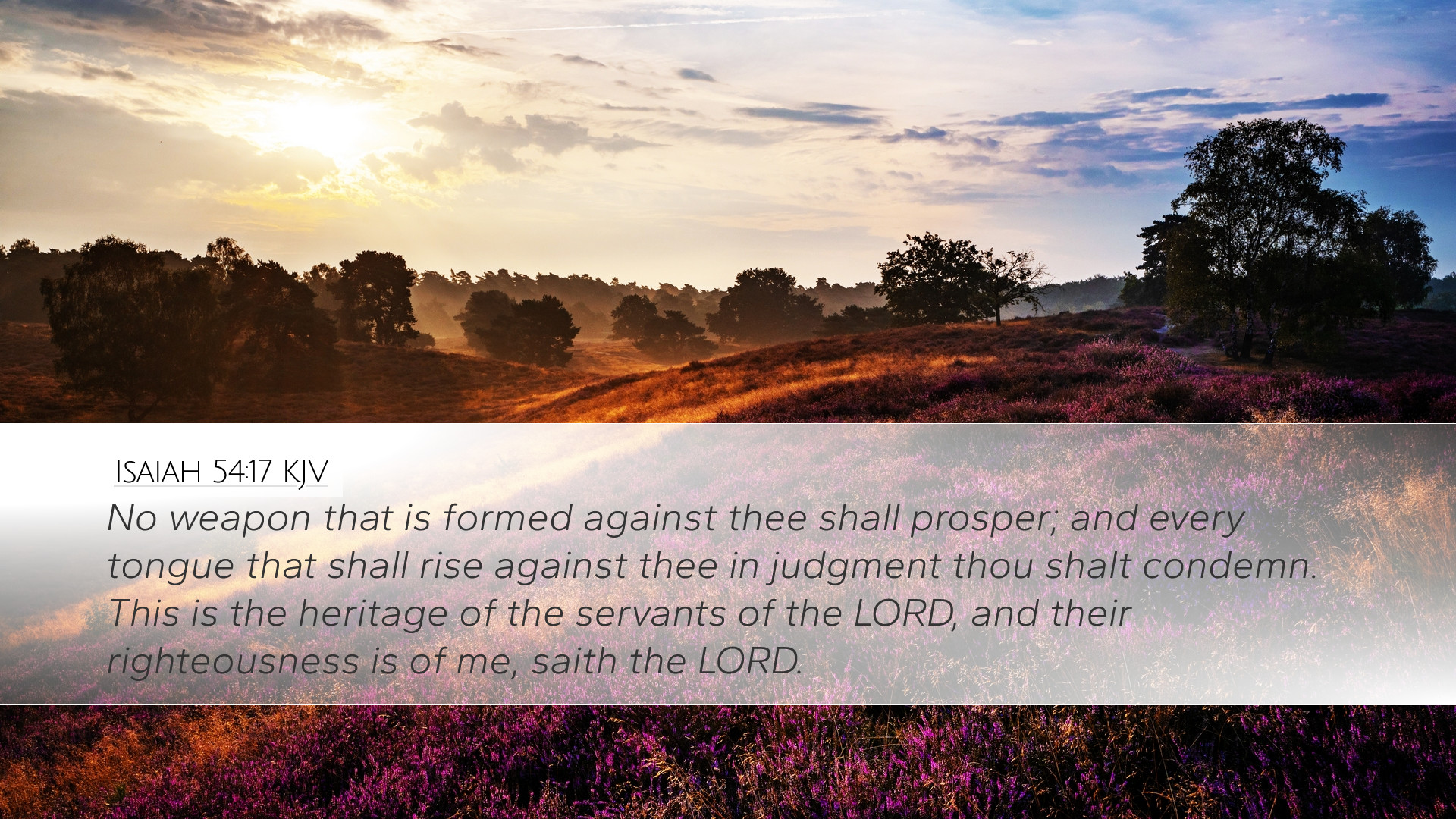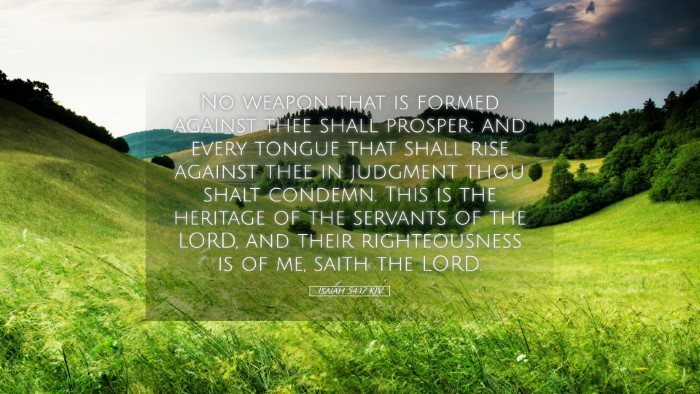Commentary on Isaiah 54:17
Verse Text: "No weapon that is formed against thee shall prosper; and every tongue that shall rise against thee in judgment thou shalt condemn. This is the heritage of the servants of the LORD, and their righteousness is of me, saith the LORD."
Introduction
This verse is a profound declaration of God's protection and vindication for His people. It stands as a declaration of the faithfulness of God and His commitment to defend His servants against all forms of opposition. The insights provided by various public domain commentaries shed light on the depth and implications of this powerful scripture.
Exegesis of the Text
Isaiah 54:17 emphasizes two important aspects: divine protection and legal vindication. The verse assures that no weapon formed against the faithful shall succeed, symbolizing both physical and spiritual threats. Additionally, it highlights the authority given to believers to condemn every tongue that unjustly judges them.
Divine Protection
Matthew Henry explains that the promise of “no weapon” implies not just physical weapons but any form of attack—be it slander, persecution, or deceit. God's assurance to the Israelites reassures them of His sovereign control and protective oversight.
Spiritual Warfare
Albert Barnes provides a compelling insight into the nature of spiritual warfare. He points out that this protection includes the spiritual challenges believers face, emphasizing that the enemy's plans will not succeed against those who trust in the Lord. This forms a strong theological basis for the idea that spiritual oppression cannot prevail when grounded in faith.
Understanding “Weapons”
Adam Clarke elaborates on the term “weapons,” illustrating that the word is broad and can encompass any form of hostility or adversity. It parallels the New Testament teaching that describes our struggles as not against flesh and blood (Ephesians 6:12), but against spiritual powers.
Condemnation of Judgment
The latter part of the verse states, "every tongue that shall rise against thee in judgment thou shalt condemn.” This judicial imagery highlights the authority granted to believers. Matthew Henry notes that the enemies who attempt to usurp a standing against God’s people not only fail but become subjects for condemnation themselves.
Authority of the Believer
Albert Barnes highlights that this condemnation is an extension of the believer's identity as a servant of the Lord. It serves as a reminder that those who stand firm in God's righteousness are given power through Christ to stand against false accusations and spiritual accusations.
The Heritage of the Servants of the Lord
This verse concludes with a poignant affirmation: "This is the heritage of the servants of the LORD." Adam Clarke indicates that such a promise is not universally applicable but is reserved for those who serve Him faithfully. It underscores the idea of spiritual inheritance that comes from a covenant relationship with God.
Righteousness from God
The phrase, “their righteousness is of me,” reinforces the doctrine of imputed righteousness. Matthew Henry explains that it is not by their works or merits that believers are justified, but solely through God’s grace, which strengthens the assurance of His protective promise. This aligns with the Pauline theology of justification by faith (Romans 5:1).
Implications for Believers
This verse serves as a powerful source of encouragement for pastors, students, and theologians alike. Understanding the promise of protection from spiritual and physical weapons leads to a deeper trust in God’s provision. The recognition of believers’ authority in judgment reminds us of our identity in Christ and the power we hold through His name.
- Encouragement in Trials: The assurance that weapons formed against us will not prosper encourages believers to remain steadfast in faith, even in adversity.
- Empowerment against Accusation: Knowing that we have the authority to condemn every tongue that speaks against us can embolden believers in spiritual confrontations.
- The Importance of Righteousness: This reminder of one’s heritage as a servant of God emphasizes the necessity of living a righteous life in accordance with His will.
Conclusion
Isaiah 54:17 is a powerful testament to God's pledge of protection and righteousness for His servants. By engaging with the insights from public domain commentaries, believers can draw strength from this promise. It encourages not only personal faith but also an understanding of God's grand narrative of redemption and protection for His people throughout the ages.


